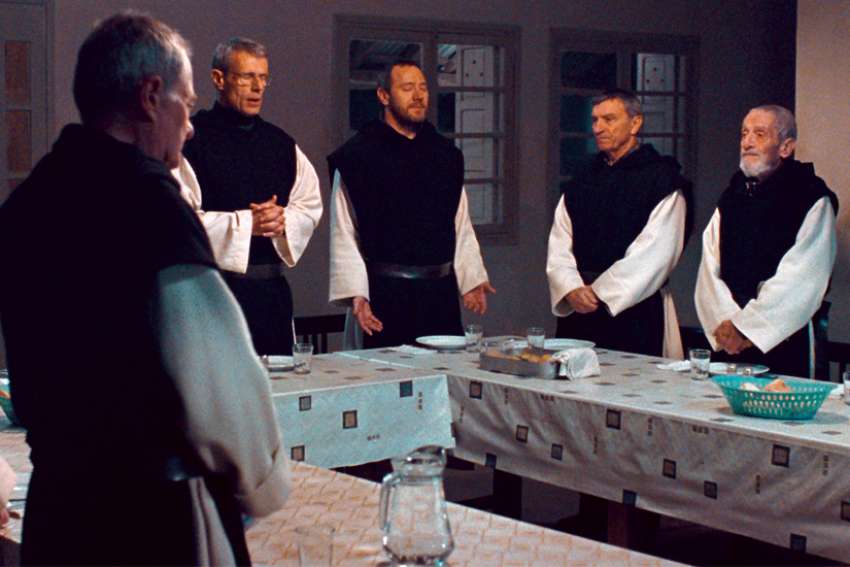Seventeen centuries before, another bishop, watching history as he knew it come crashing down around him, spoke to his flock in this way: “Bad times! Troublesome times! People are saying this. Let our lives be good and the times will be good. We make our times; such as we are, such are the times” (St. Augustine, Sermon 30).
Augustine, who saw Rome ravaged and its empire collapse, challenged his people not to be defined by history but to re-imagine the history they were living. Like St. Paul before him, he urged Christians to “redeem the times” (Ephesians 5:16).
Which voice do we follow? How do we redeem our time, the time of virus, sickness, disarray, disharmony and confusion?
An example of redeeming the times that came to my heart began with the French-made, Cannes-awarded movie Des hommes et des dieux (Of Gods and Men). Since then, discovering the story on which the movie was based, reading further, discussing with others, talking with people who had visited the monastery the movie centred on, reflecting and praying with it all, I have learned much, but still I have much more to learn and ponder.
It’s a rich, astounding story of people who acted in faith and love in face of violence. A small fraternity of men were true to themselves and their vision, to the point of being murdered rather than abandon the way of life they had committed to and the people they had committed to serving.
There are many levels to this story — inter-faith relations, monasticism, non-violent resistance, corrupt political alliances, radical hospitality, the meaning of a vow of stability. It’s also a story of international relations in which French monks in an Algerian monastery kept faith, long past the point at which French-Algerian relations and intra-Algerian warfare rendered their presence tenuous and put their lives at risk.
Some decades earlier, the Algerian people had suffered through French occupation of their country. The French withdrew but the two nations’ stories could not help but be intertwined. Something had drawn these men from their native France, in a decision to stand with some of the poorest and least important citizens of Algeria.
Their self-gift could be said to be both traditional and novel. Something deep in the roots of Christianity led them to live in a way long-established and recognizable. And something creative led them to live in ways that shook boundaries.
If they couldn’t completely fit in the system — monastic in France, political in Algeria — they could and did find a way to live their freedom in it. Though the price was first their liberty and eventually their lives, the record clearly shows that they accepted their bondage, and their deaths, in the freedom of love.
What difference did their self-gift make? At their funeral and burial, Algerian villagers and states-people mourned together with French clerics, hierarchs and dignitaries. The conflicts that led to the violent deaths of many, including these seven Trappist monks, were nowhere near settled. Yet the grief at their loss was felt on all sides, and to this day touches us.
The monks of Tibhirine couldn’t escape the violence of Algerian-French history. They could, and did, find — at great personal cost — a different way to be in that story. Notably, they did not do so alone, but in communion with their community, other religious and the local Church and bishop.
Their story witnesses the pattern in the healing of trauma, whether personal or collective. There is a way of transformation. It’s not easy, it’s not quick-fix and it’s not virtual. It is real. It is a glimpse of the pattern God has revealed to us in Christ.
Learning this story, it’s hard to escape the question their lives ask of us: do the violent, self-interested and power-hungry feel threatened by our way of living our Christian faith? Do the poor, those hungering for peace and the vulnerable feel enriched by it?
May I replace, in C.S. Lewis’ 1948 reflection, his words “atomic bomb” with “virus”: “If we are all going to be destroyed by a virus, let that virus when it comes find us doing sensible and human things — praying, working, teaching, reading, listening to music, bathing the children, playing tennis, chatting to our friends over a pint and a game of darts — not huddled together like frightened sheep and thinking about viruses.”
When the virus of human violence struck, the monks were living normalcy — the doctor among them was seeing dozens of patients daily, the cook was driving dangerous roads into town for groceries, they were keeping the liturgical hours and having regular community meetings.
(Marrocco can be reached at marrocco7@sympatico.ca.)


